|
|
|
Sort Order |
|
|
|
Items / Page
|
|
|
|
|
|
|
| Srl | Item |
| 1 |
ID:
153635
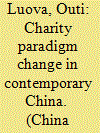

|
|
|
|
|
| Summary/Abstract |
This article addresses a remarkable conceptual change in China: the replacement of the perception of charities as organizations associated with anti-governmental activity by one that views charities as organized expressions of civic duty. This shift occurred within a period of just 20 years. Following theories of public policy paradigm change, this study analyses the specific societal, institutional and rhetorical changes that were required for the rehabilitation of charity in China; the articulation of a blueprint for the new paradigm; and the implementation of the model in practice, focusing on attempts to foster a charitable spirit and culture. This study is based on official documents and articles in the People’s Daily (人民日报). Furthermore, the analysis is complemented by interviews with staff members of charity associations carried out in Tianjin in 2007 and 2008. The findings contribute to the broader discussion of the features of China’s civil society by elaborating on the boundaries of acceptable civic action. The study shows how the party-state has permitted the emergence of a space for the expression of a voluntary charitable spirit while still expecting that charitable spirit to be expressed within the confines of state-defined morally correct acts.
|
|
|
|
|
|
|
|
|
|
|
|
|
|
|
|
| 2 |
ID:
153638
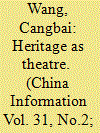

|
|
|
|
|
| Summary/Abstract |
Since China’s signing of UNESCO’s World Heritage Convention in 1985, cultural heritage in China has become a booming industry and a key area of scholarly investigation. The mainstream literature on China’s heritage and urbanization tends to view heritage as a civilizing agent to regulate and improve the urban population. Drawing on Clifford Geertz’s notion of ‘theatre state’ and through a case study of Jiangmen, this article reconceptualizes China’s urban heritage industry as ‘theatre’. It shifts the focus away from neat political rationalities to messy ‘magical assemblages’, such as dramatic museum representation, monumental architecture and expressive ceremonies, in state-led heritage-making processes. It argues that the Chinese government makes heritage by using not only the means of political rationalities but also, and perhaps more importantly, the power of spectacle, sensation and awe. China’s heritage industry is thus as much ‘a technique of enchantment’ as ‘a technique of government’, revealing complicated processes of China’s negotiation with the Western-centred conceptualization of modernity and cultural heritage. Additionally, it draws attention to diasporic resources in urban heritage-making, broadening the existing research that has predominantly focused on the employment of nostalgic and/or exotic appeal for city branding and development.
|
|
|
|
|
|
|
|
|
|
|
|
|
|
|
|
| 3 |
ID:
153640


|
|
|
|
|
| Summary/Abstract |
China’s relations with communities of Chinese overseas and its attempts to improve these relations are challenged by the weakening ties between younger generations of Chinese overseas and China. This article examines Chinese government-sponsored camps which were developed to counteract the estrangement of Chinese overseas youth through exposure to Chinese culture, language, history and society. Drawing on a historical account of the programme and fieldwork performed among Chinese-Filipino youth in Xiamen, it argues that China’s youth camps programme is more than a top–down, transnational initiative aimed at influencing the ethnic and cultural identities of these youths. Instead, these camps embody a convergence of national, institutional and personal agendas (e.g. the long-standing Beijing–Taipei rivalry, the self-defined agendas of Chinese overseas, and local officials’ desires to garner political credit from upper-level authorities). This study also argues that the programme has made substantial contributions to Chinese language learning and to a relatively positive image of China among Chinese-Filipino participants and that its influence on the cultural and ethnic orientations of Chinese-Filipino youth has been stronger than its impact on their political identity.
|
|
|
|
|
|
|
|
|
|
|
|
|
|
|
|
| 4 |
ID:
153636
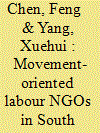

|
|
|
|
|
| Summary/Abstract |
Movement-oriented labour NGOs in China are groups committed to the advancement of workers’ collective interests in a way very similar to that of trade unions in other countries. As the gap between workers’ demands for collective bargaining and their lack of union representation widens, the role of movement-oriented labour NGOs has increased. These NGOs are led and driven by former workers who have a strong consciousness of workers’ rights and who fought in the workplace for their fellow workers’ interests as well as their own. The leadership shown by former workers significantly accounts for the behavioural patterns and strategic choices of movement-oriented labour NGOs. The study reported in this article uses two descriptive concepts to characterize the emergence and role of movement-oriented labour NGOs: exit with voice and displaced unionism. The former refers to the social process by which former workers become activists of movement-oriented labour NGOs, while the latter points to a grass-roots labour movement facilitated from outside the factory gates. This article argues that, while having performed a trade union-like role and promoted worker-led collective bargaining, movement-oriented labour NGOs embody a fundamental predicament of the Chinese labour movement, which is that organized labour activism in the Chinese workplace is largely prohibited.
|
|
|
|
|
|
|
|
|
|
|
|
|
|
|
|
| 5 |
ID:
153639
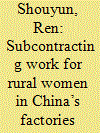

|
|
|
|
|
| Summary/Abstract |
Industrial subcontracting work in rural China has been framed as a win-win strategy for women and industry. Drawing on fieldwork conducted in Hebei Province, I argue that far from being the main beneficiaries of subcontracting work, such rural industrialization has instead subjected women to a gendered form of capitalist exploitation. First, the women employed were not a random group but were young, healthy women who already had industrial skills, and thus did not need training. Second, these women were rendered immobile by their family responsibilities. Third, the problems of ‘left-behind’ children and an urban, modern notion of motherhood trickling down to the countryside has constructed a notion of virtuous motherhood. Further undermining their position, women workers had no influence over production or profits in the subcontracting chain. Despite the promise that subcontracting work would be flexible for women, such flexibility benefits the production chain more than women workers. Local (and changing) gender and development dynamics in rural China condition the experiences of women involved in initiatives that are seen as a win-win situation by some development agencies, advocacy groups and policy researchers.
|
|
|
|
|
|
|
|
|
|
|
|
|
|
|
|
| 6 |
ID:
153637
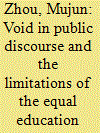

|
|
|
|
|
| Summary/Abstract |
Because of the huge impact of the hukou system (户口制度) on the allocation of educational resources in China, migrant children’s access to schools has long been circumscribed. Since 2009, a group of migrant parents in Beijing has been involved in a movement demanding their children’s right to sit for the college entrance exam in the city. Using ethnographic methods, this article reviews how the idea of equal education was contested among four groups: (1) liberal intellectuals as the leaders of the movement; (2) middle-class migrant parents as the major activists; (3) working-class migrant parents as the subjects for mobilization; and (4) participants in counter-movements. Despite the involvement of liberal intellectuals that has helped the movement make an inclusive claim, the movement has largely remained parochial, and to some extent it even served to reinforce inequality in China’s education system. I use the equal education movement as a case to reflect upon the ‘boundary pushing’ approach in studies on China’s public sphere, and contend that researchers should pay more attention to the internal power dynamics of social movement.
|
|
|
|
|
|
|
|
|
|
|
|
|
|
|
|
|
|
|
|
|